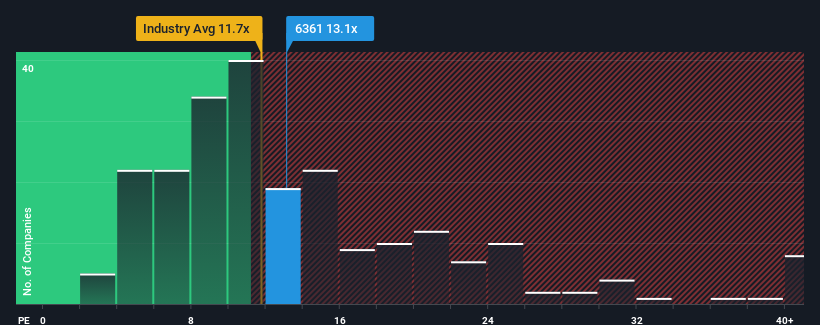Ebara Corporation (TSE:6361) May Have Run Too Fast Too Soon With Recent 26% Price Plummet

The Ebara Corporation (TSE:6361) share price has fared very poorly over the last month, falling by a substantial 26%. Looking at the bigger picture, even after this poor month the stock is up 43% in the last year.
In spite of the heavy fall in price, it's still not a stretch to say that Ebara's price-to-earnings (or "P/E") ratio of 13.1x right now seems quite "middle-of-the-road" compared to the market in Japan, where the median P/E ratio is around 13x. However, investors might be overlooking a clear opportunity or potential setback if there is no rational basis for the P/E.
With earnings growth that's superior to most other companies of late, Ebara has been doing relatively well. It might be that many expect the strong earnings performance to wane, which has kept the P/E from rising. If not, then existing shareholders have reason to be feeling optimistic about the future direction of the share price.
See our latest analysis for Ebara

Is There Some Growth For Ebara?
There's an inherent assumption that a company should be matching the market for P/E ratios like Ebara's to be considered reasonable.
Retrospectively, the last year delivered an exceptional 38% gain to the company's bottom line. Pleasingly, EPS has also lifted 136% in aggregate from three years ago, thanks to the last 12 months of growth. Accordingly, shareholders would have probably welcomed those medium-term rates of earnings growth.
Shifting to the future, estimates from the six analysts covering the company suggest earnings should grow by 5.4% per year over the next three years. Meanwhile, the rest of the market is forecast to expand by 9.7% each year, which is noticeably more attractive.
In light of this, it's curious that Ebara's P/E sits in line with the majority of other companies. Apparently many investors in the company are less bearish than analysts indicate and aren't willing to let go of their stock right now. These shareholders may be setting themselves up for future disappointment if the P/E falls to levels more in line with the growth outlook.
What We Can Learn From Ebara's P/E?
With its share price falling into a hole, the P/E for Ebara looks quite average now. We'd say the price-to-earnings ratio's power isn't primarily as a valuation instrument but rather to gauge current investor sentiment and future expectations.
We've established that Ebara currently trades on a higher than expected P/E since its forecast growth is lower than the wider market. When we see a weak earnings outlook with slower than market growth, we suspect the share price is at risk of declining, sending the moderate P/E lower. This places shareholders' investments at risk and potential investors in danger of paying an unnecessary premium.
And what about other risks? Every company has them, and we've spotted 2 warning signs for Ebara you should know about.
You might be able to find a better investment than Ebara. If you want a selection of possible candidates, check out this free list of interesting companies that trade on a low P/E (but have proven they can grow earnings).
Valuation is complex, but we're here to simplify it.
Discover if Ebara might be undervalued or overvalued with our detailed analysis, featuring fair value estimates, potential risks, dividends, insider trades, and its financial condition.
Access Free AnalysisHave feedback on this article? Concerned about the content? Get in touch with us directly. Alternatively, email editorial-team (at) simplywallst.com.
This article by Simply Wall St is general in nature. We provide commentary based on historical data and analyst forecasts only using an unbiased methodology and our articles are not intended to be financial advice. It does not constitute a recommendation to buy or sell any stock, and does not take account of your objectives, or your financial situation. We aim to bring you long-term focused analysis driven by fundamental data. Note that our analysis may not factor in the latest price-sensitive company announcements or qualitative material. Simply Wall St has no position in any stocks mentioned.
Have feedback on this article? Concerned about the content? Get in touch with us directly. Alternatively, email editorial-team@simplywallst.com
About TSE:6361
Excellent balance sheet with proven track record and pays a dividend.
Similar Companies
Market Insights
Community Narratives


